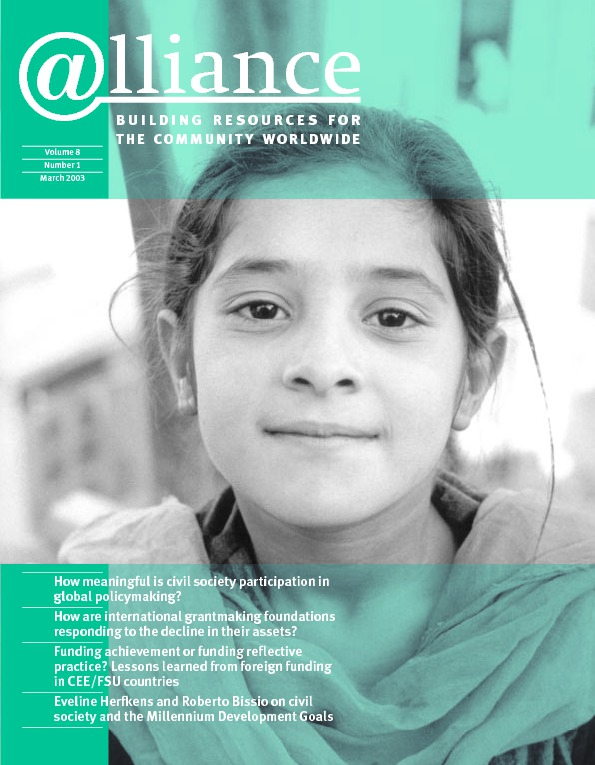New ICT network formed
A workshop on ICT Policy and Civil Society in Addis Ababa in November 2002 brought together over 80 representatives from civil society organizations from all regions of Africa to discuss the role of African civil society in ICT (information and communication technologies) policymaking.
Convened by the Association for Progressive Communications (APC), Article
19 and the UN Economic Commission for Africa (UNECA), the workshop sparked the formation of a network of people dedicated to building an inclusive information society in Africa.
The aims of the event were, firstly, for civil society actors to share their experiences and build on the knowledge that they already had; secondly, to identify the needs of those organizations in regard to developing an ICT policy at both national and international level; lastly, to identify the strategies required to meet those needs.
Workshop participants drew up a statement on African civil society’s engagement in ICT policy development and an action plan for mobilizing other organizations on these issues. This sets out a course of action to include: information sharing; lobbying at national and international levels (especially at the World Summit on the Information Society in December 2003); a free/open source software task force; and development of a cross-regional information exchange for community radio organizations.
For more details, contact Emmanuel Njenga Njuguna at APC at njenga@apc.org or africa.rights@apc.org or heather@apc.org
Regional Seminar on Investment for Development
The First Regional Seminar under the ‘Investment for Development’ (IFD) project took place in October in Nairobi, organized by the Centre for Trade Economics & Environment (CUTS-CITEE) and Eco News Africa (ENA) in collaboration with UNCTAD. Participants discussed economic and political issues relating to Foreign Direct Investment (FDI), in order to better understand national, regional and international rule-making in this area. Project researchers from South Africa, Tanzania and Zambia also presented their findings.
For more information, contact Sanchita Chatterjee or Ruchi Sharma at ifd_cuts@rediffmail.com or cuts@cuts.org
Davos door shut on Africa?
With only a handful of African officials present and no African issues on the agenda, those African officials and NGOs who were at the World Economic Forum felt that the gathering had failed them.
‘In the consciousness of the participants here, Africa is very much a side show,’ said CIVICUS’s Kumi Naidoo. He noted in particular the absence of Africa in the high-profile economic outlook survey presented at Davos. Adding to this impression, former US president Bill Clinton and Niall Fitzgerald, CEO of Unilever, both cancelled an appearance at a press conference on Africa on 28 January to discuss the New Partnership for African Development (NEPAD). Even at the level of panels and discussion sessions, only five of the 300 were devoted to problems or topics directly related to Africa.
Source: IPS News, Terra Viva Online, 28 January 2003
ActionAid Africa documents work on gender mainstreaming
ActionAid Africa has just completed a two-year exercise documenting its work on gender mainstreaming in ten African countries. Over the last decade, ActionAid has attempted to address the vulnerability and inequalities of women in the region through a mixture of work programmes, training, advocacy and research.
The research noted progress in respect of women’s involvement in community affairs, some preparedness on the part of men to undertake tasks that had previously been done by women, and marked community benefit from the successful running of a number of women-only projects. However, it also noted the persistence of entrenched discriminatory beliefs and practices, and of increased workloads for women when they attempted to combine domestic and project activities. The reports are available in written form, and will shortly be produced in video and CD-Rom form.
For more details, contact admin@aafrica.org.zw
Publications
Democracy and Civil Society in Nigeria
Matthew Hassan Kukah Spectrum Books (Nigeria) £8.80/$11.73
Examines the main issues behind the failure of democracy in Nigeria and suggests a mechanism for instituting and sustaining frameworks for a lasting democracy in the country.
To order, visit http://www.spectrumsafari.com
Conferences
26-27 March 2003 An Enabling Legal Environment for Non-Profit Organizations CAF South Africa Johannesburg, South Africa Contact Craig Naicker at craig@progressivepr.co.za




Comments (0)